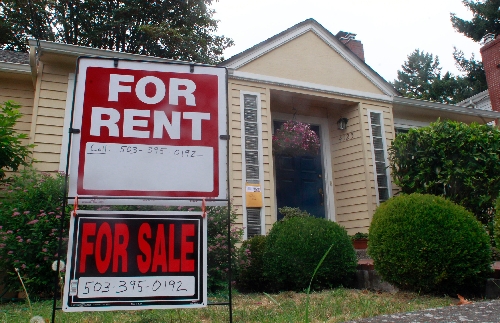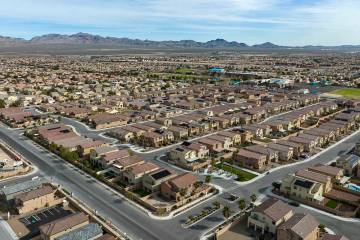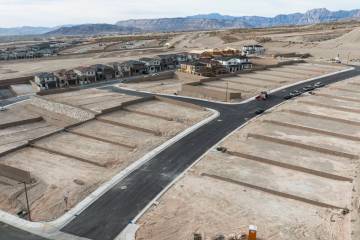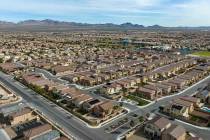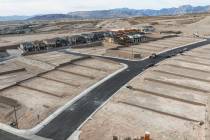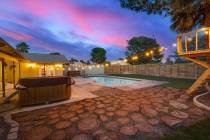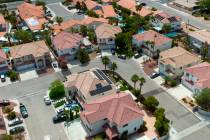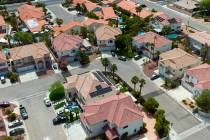U.S. home sales jump 7.7 percent; local activity continues trend
WASHINGTON -- The number of Americans who bought previously occupied homes rose in August. But the sales were driven by an increase in foreclosures, a sign that home prices could fall further next year and slow a housing recovery.
The National Association of Realtors said Wednesday that home sales rose 7.7 percent last month to a seasonally adjusted annual rate of 5.03 million homes. That's below the 6 million that economists say is consistent with a healthy housing market.
Last month's pace was slightly ahead of the 4.91 million sold in 2010, the worst sales level in 13 years.
Housing statistics for Las Vegas reveal nothing unusual in August, just more of the same activity that's been documented for the past two years, said Larry Murphy, president of SalesTraq. He reported 5,699 closings in August, a 31.2 percent jump from the same month a year ago, and up from 4,828 in July.
Resale closings should hit 55,000 by the end of the year, about the same as in the boom years of 2004 and 2005, he said. Bank repossessions will fall to about 20,000, compared with 22,000 for each of the past three years. Eighty percent of resale homes are vacant and 50 percent are sold for cash.
"So what about the future? When will things begin to change? No one knows," Murphy said. "Here's what we do know. Since 2007, over 100,000 homes have been foreclosed upon. What we don't know is how many more homes are yet to be foreclosed upon in the future."
Of the 400,000 homes in Las Vegas carrying a mortgage, roughly 16 percent are delinquent by 90 days or more, so the odds of them going to foreclosure are high , Murphy said.
"That's 65,000 future foreclosures for sure. But it won't end at that, because more people are falling behind in their mortgage payments every day. My guess is that we have at least another 100,000 foreclosures in our future, which means we are only halfway through this mess, and it could be another three to four years before it's all over," the Las Vegas housing analyst said.
Homes at risk of foreclosure made up 31 percent of sales, according to NAR. That's up from 29 percent in July. Many of the sales went to investors, who are increasingly buying homes priced under $100,000. Sales in that category rose in August while sales of more expensive homes fell.
At the same time, activity among first-time buyers, who are critical to reviving the housing market, didn't budge. First-time buyers made up only 32 percent of sales, matching the July level. They normally make up 50 percent of home sales in healthy markets.
Economists offered a bleak outlook for the next few months.
"With economic growth sputtering, the modest recovery we have seen so far in home sales is likely to become even more sluggish," said Sam Bullard, senior economist at Wells Fargo.
Paul Dales, senior U.S. economist at Capital Economics, said weaker consumer confidence and the "associated surge in concerns about the health of the overall economy," could send sales falling further this fall.
"There is a real possibility that all this put off potential buyers, meaning that fewer deals were signed in August and that existing home sales will fall back in September," he said.
Yet another complication: New maximum loan limits by government-controlled mortgage buyers Fannie Mae and Freddie Mac. On Oct. 1, the maximum loan in high-cost areas will fall from $729,750 to $625,500 and, in some areas, to $550,000. That means some buyers will be unable to get mortgages in cities where homes are more expensive, such as New York, San Francisco and Washington.
More than two years after the recession officially ended, many people can't qualify for loans or meet higher down-payment requirements. Even those with excellent credit and stable jobs are holding off because they fear that home prices will keep falling. Home sales are also being hurt by a steep decline in first-time buyers.
Sales have fallen in four of the five years since the housing boom went bust in 2006.
Most economists say home prices will keep falling, by at least 5 percent, through the rest of the year. Many forecasts don't anticipate a rebound in prices until at least 2013
The median sales price dropped roughly to $168,300 in August from July. A key reason was the rise in foreclosures and short sales -- when a lender accepts less than what is owed on the mortgage. Those homes sell at an average discount of 20 percent.
Investors are taking advantage of the discounts. Their purchases made up 22 percent of all sales last month, compared with 18 percent in July.
The high rate of foreclosures has made re-sold homes much cheaper than new homes. The median price of a new home is roughly 30 percent higher than the price of one that's been occupied before -- twice the normal markup.
And deals that are near closing are falling apart at the last minute.
Contracts were canceled at a higher rate in August, with 18 percent of Realtors saying they had at least one contract scuttled. That's up from 16 percent in July.
The Obama administration is trying to expand a program that allows homeowners to refinance their mortgages. But economists say that will do little to help the depressed housing market.
Across the country, home sales rose in every region. In the West, sales increased 18.3 percent, with prices there dropping significantly over the past year. Sales rose 5.4 percent in the South, 3.8 percent in the Midwest and 2.7 percent in the Northeast.
The glut of unsold homes declined slightly in August to 3.58 million homes. At last month's sales pace, it would take 8.5 months to clear those homes. Analysts say a healthy supply can be cleared in six months.
Review-Journal writer Hubble Smith contributed to this report.



